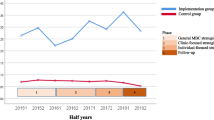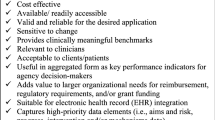Abstract
Despite the strengths of routine outcome monitoring (ROM) in community mental health settings, there are a number of barriers to effective implementation of ROM, including measurement error due to provider factors (e.g., training level) and non-target client factors (i.e., client characteristics which have no meaningful relationship to the outcome of interest). In this study, ROM data from 80 client-provider dyads were examined for sources of variance due to provider factors and non-target client factors. Results indicated that provider factors and non-target client factors accounted for between 9.6 and 54% of the variance in the ROM measures. Our findings supported past research that provider characteristics impact ROM, and added the novel finding that client gender, age, diagnosis, and cognition also impact ROM. Methods to increase accuracy and utility of ROM in community mental health are discussed.

Similar content being viewed by others
Notes
Serious mental illness here refers to psychotic spectrum disorders that cause significant impairment in functioning, typically including schizophrenia spectrum disorders and mood disorders with psychotic features, as well as occasionally including trauma-induced disorders and obsessive–compulsive disorders depending on presentation and functional impact.
References
Amble, I., Gude, T., Stubdal, S., Andersen, B. J., & Wampold, B. E. (2015). The effect of implementing the Outcome Questionnaire-45.2 feedback system in Norway: A multisite randomized clinical trial in a naturalistic setting. Psychotherapy Research, 25(6), 669–677. https://doi.org/10.1080/10503307.2014.928756.
APA Presidential Task Force on Evidence-Based Practice. (2006). Evidence-based practice in psychology. American Psychologist, 61(4), 271–285.
Baldwin, S. A., & Imel, Z. E. (2013). Therapist effects: Findings and methods. In M. J. Lambert (Ed.), Bergin and Garfield’s handbook of psychotherapy and behavior change (pp. 258–297). Hoboken, NJ: Wiley.
Barker, S., Barron, N., McFarland, B. H., & Bigelow, D. A. (1994). A community ability scale for chronically mentally ill consumers: Part I. Reliability and validity. Community Mental Health Journal, 30, 363–383.
Bijl, R. V., & Ravelli, A. (2000). Psychiatric morbidity, service use, and need for care in the general population: Results of The Netherlands Mental Health Survey and Incidence Study. American Journal of Public Health, 90(4), 602–607.
Bilsker, D., & Goldner, E. M. (2002). Routine outcome measurement by mental health-care providers: Is it worth doing? The Lancet, 360, 1689–1690.
Boswell, J. F., Constantino, M. J., Kraus, D. R., Bugatti, M., & Oswald, J. M. (2016). The expanding relevance of routinely collected outcome data for mental health care decision making. Administration and Policy in Mental Health, 43, 482–491.
Boswell, J. F., Kraus, D. R., Miller, S. D., & Lambert, M. J. (2015). Implementing routine outcome monitoring in clinical practice: Benefits, challenges, and solutions. Psychotherapy Research, 25(1), 6–19. https://doi.org/10.1080/10503307.2013.817696.
Burgess, P., Pirkis, J., & Coombs, T. (2015). Routine outcome measurement in Australia. International Review of Psychiatry, 27(4), 264–275. https://doi.org/10.3109/09540261.2014.977234.
Carli, L. L. (1999). Gender, interpersonal power, and social influence. Journal of SocialIssues, 55(1), 81–99.
Corcoran, R., Mercer, G., & Frith, C. (1995). Schizophrenia, symptomatology, and social inference: Investigating “theory of mind” in people with schizophrenia. Schizophrenia Research, 17, 5–13.
Cradock, J., Young, A. S., & Sullivan, G. (2001). The accuracy of medical record documentation in schizophrenia. Journal of Behavioral Health Services & Research, 28(4), 456–465.
de Jong, K., Timman, R., Hakkaart-Van Roijen, L., Vermeulen, P., Kooiman, K., Passchier, J., & Busschbach, J. V. (2014). The effect of outcome monitoring feedback to clinicians and patients in short and long-term psychotherapy: A randomized controlled trial. Psychotherapy Research, 24(6), 629–639. https://doi.org/10.1080/10503307.2013.871079.
Drake, R. E., Bond, G. R., & Essock, S. M. (2009). Implementing evidence based practices for people with schizophrenia. Schizophrenia Bulletin, 35(4), 704–713.
Fusar-Poli, P., Papanastasiou, E., Stahl, D., Rocchetti, M., Carpenter, W., Shergill, S., & McGuire, P. (2015). Treatments of negative symptoms in schizophrenia: Meta-analysis of 168 randomized placebo-controlled trials. Schizophrenia Bulletin, 41(4), 892–899. https://doi.org/10.1093/schbul/sbu170.
Garb, H. N. (1989). Clinical judgement, clinical training, and professional experience. Psychological Bulletin, 105(3), 387–396.
Gelkopf, M., Pagorek-Eshel, S., Trauer, T., & Roe, D. (2015). Routine outcome measurement in mental health service consumers: Who should provide support for the self-assessments? Evaluation and Program Planning, 50, 43–46. https://doi.org/10.1016/j.evalprogplan.2015.02.001.
Gilbody, S. M., House, A. O., & Sheldon, T. A. (2001). Routinely administered questionnaires for depression and anxiety: Systemic review. BMJ, 322, 406–409.
Gilbody, S. M., House, A. O., & Sheldon, T. A. (2002a). Outcomes research in mental health: Systematic review. The British Journal of Psychiatry, 181, 8–16.
Gilbody, S. M., House, A. O., & Sheldon, T. A. (2002b). Routine administration of Health Related Quality of Life (HRQoL) and needs assessment instruments to improve psychological outcome- a systematic review. Psychological Medicine, 32, 1345–1356.
Gilbody, S. M., House, A. O., & Sheldon, T. A. (2002c). Psychiatrists in the UK do not use outcomes measures. British Journal of Psychiatry, 180, 101–103.
Hatfield, D. R., & Ogles, B. M. (2004). The use of outcome measures by psychologists in clinical practice. Professional Psychology: Research & Practice, 35(5), 485–491.
Hatfield, D. R., & Ogles, B. M. (2007). Why some clinicians use outcome measures and others do not. Administration and Policy in Mental Health and Mental Health Services Research, 34, 283–291.
Hill, C. E., Spiegel, S. B., Hoffman, M. A., Kivilighan, D. M., & Gelso, C. I. (2017). Therapist expertise in psychotherapy revisited. The Counseling Psychologist, 45(1), 7–53.
Hoenders, R. H. J., Bos, E. H., Bartels-Velthuis, A. A., Vollbehr, N. K., van der Ploeg, K., de Jonge, P., & de Jong, J. T. V. M. (2014). Pitfalls in the assessment, analysis, and interpretation of routine outcome monitoring (ROM) data: Results from an outpatientclinic for integrative mental health. Administration and Policy in Mental Health and Mental Health Services Research, 41(5), 647–659. https://doi.org/10.1007/s10488-013-0511-7.
Hróbjartsson, A., Thomsen, A. S. S., Emanuelsson, F., Tendal, B., Hilden, J., Boutron, I., … Brorson, S. (2013). Observer bias in randomized clinical trials with measurement scale outcomes: a systematic review of trials with both blinded and nonblinded assessors. Canadian Medical Association Journal. https://doi.org/10.1503/cmaj.120744.
Ionita, G., & Fitzpatrick, M. (2014). Bringing science to clinical practice: A Canadian survey of psychological practice and usage of progress monitoring measures. Canadian Psychology/Psychologie Canadienne, 55(3), 187–196. https://doi.org/10.1037/a0037355.
Ionita, G., Fitzpatrick, M., Tomaro, J., Chen, V. V., & Overington, L. (2016). Challenges of using progress monitoring measures: Insights from practicing clinicians. Journal of Counseling Psychology, 63(2), 173–182. https://doi.org/10.1037/cou0000122.
Jastak, J. F., Jastak, S. R., & Wilkinson, G. S. (1993). The Wide-range achievement test, revised 2. Wilmington: Guidance Associates of Delaware.
Jensen, R. E., Rothrock, N. E., DeWitt, E. M., Spiegel, B., Tucker, C. A., Crane, H. M., … Crane, P. K. (2015). The role of technical advances in the adoption and integration of patient-reported outcomes in clinical care. Medical Care, 53(2), 153–159. https://doi.org/10.1097/MLR.0000000000000289.
Jensen-Doss, A., & Hawley, K. M. (2010). Understanding barriers to evidence-based assessment: Clinician attitudes towards standardized assessment tools. Journal of Clinical Child and Adolescent Psychology, 39(6), 885–896.
Kendrick, T., El-Gohary, M., Stuart, B., Gilbody, S., Churchill, R., Aiken, L., … Moore, M. (2016). Routine use of patientclient reported outcome measures (PROMs) for improving treatment of common mental health disorders in adults. In The Cochrane Collaboration (Ed.), Cochrane database of systematic reviews. Chichester: Wiley https://doi.org/10.1002/14651858.CD011119.pub2.
Kenny, D. A. (1996). Models of non-independence in dyadic research. Journal of Social and Personal Relationships, 13(2), 279–294. https://doi.org/10.1177/0265407596132007.
Kotte, A., Hill, K. A., Mah, A. C., Korathu-Larson, P. A., Au, J. R., Izmirian, S., … Higa-McMillan, C. K. (2016). Facilitators and barriers of implementing a measurement feedback system in public youth mental health. Administration and Policy in Mental Health and Mental Health Services Research, 43(6), 861–878. https://doi.org/10.1007/s10488-016-0729-2.
Krampen, G. (1991). Inventory on competence and control beliefs. Gottingen: Hogrefe.
Lambert, M. J. (2003). Is it time for clinicians to routinely track patientt outcome? A meta-analysis. Clinical Psychology: Science and Practice, 10(3), 288–301. https://doi.org/10.1093/clipsy/bpg025.
Lang, K., Meyers, J. L., Korn, J. R., Lee, S., Sikirica, M., Crivera, C., Dirani, R., & Menzin, J. (2010). Medication adherence and hospitalization among patients with schizophrenia treated with antipsychotics. Psychiatric Services, 61, 1239–1247.
Lyon, A. R., Dorsey, S., Pullmann, M., Silbaugh-Cowdin, J., & Berliner, L. (2015). Clinician use of standardized assessments following a common elements psychotherapy training and consultation program. Administration and Policy in Mental Health and Mental Health Services Research, 42(1), 47–60. https://doi.org/10.1007/s10488-014-0543-7.
McHorney, C. A., & Tarlov, A. R. (1994). The use of health status measures for individual patient level applications: Problems and prospects. Quality of Life Research, 3(1), 43–44.
Miller, S. D., Hubble, M. A., Chow, C., & Seidel, J. (2015). Beyond measures and monitoring: Realizing the potential of feedback-informed treatment. Psychotherapy, 52(4), 449–457.
Reddy, L. F., Horan, W. P., & Green, M. F. (2015). Motivational deficits and negative symptoms in schizophrenia: Concepts and assessments. In Behavioral neuroscience of motivation (pp. 357–373). Cham: Springer. https://doi.org/10.1007/7854_2015_379.
Reitan, R. M., & Wolfson, D. (1985). The Halstead-Reitain neuropsychological test battery: Therapy and clinical interpretation. Tucson, AZ: Neuropsychological Press.
Roe, D., Drake, R. E., & Slade, M. (2015a). Routine outcome monitoring: An international endeavour. International Review of Psychiatry, 27(4), 257–260. https://doi.org/10.3109/09540261.2015.1070552.
Roe, D., Gelkopf, M., Gornemann, M. I., Baloush-Kleinman, V., & Shadmi, E. (2015b). Implementing routine outcome measurement in psychiatric rehabilitation services in Israel. International Review of Psychiatry, 27(4), 345–353. https://doi.org/10.3109/09540261.2015.1025722.
Rosenheck, R., Fontana, A., & Stolar, M. (1999). Assessing quality of care: Administrative indicators and clinical outcomes in posttraumatic stress disorder. Med Care, 37, 180–1888.
Sajatovic, M., Micula-Gondek, W., Tatuoka, C., & Bialko, C. (2011). The relationship of gender and gender identity to treatment adherence among individuals with bipolar disorder. Gender Medicine, 8(4), 261–268.
Serby, M. (2003). Psychiatric resident conceptualizations of mood and affect within the mental status examination. American Journal of Psychiatry, 160(8), 1527–1529. https://doi.org/10.1176/appi.ajp.160.8.1527.
Spaulding, W., & Deogun, J. (2011). A pathway to personalization of integrated treatment: Informatics and decision science in psychiatric rehabilitation. Schizophrenia Bulletin, 37, 129–137.
Spreen, O., & Strauss, E. A. (1998). Compenium of neuropsychological tests: Administration, norms, and commentary (2nd ed.). New York: Oxford.
Tait, L., Birchwood, M., & Trower, P. (2002). A new scale (SES) to measure engagement with community mental health services. Journal of Mental Health, 11(2), 191–198.
Trauer, T., Callaly, T., & Herrman, H. (2009). Attitudes of mental health staff to routine outcome measurement. Journal of Mental Health, 18(4), 288–297. https://doi.org/10.1080/09638230701879177.
Ussher, J. M. (2013). Diagnosing difficult women and pathologising feminity: Genderbias in psychiatric nosology. Feminism & Psychology, 23(1), 63–69.
Wampold, B. E. (2015). Routine outcome monitoring: Coming of age—With the usual developmental challenges. Psychotherapy, 52(4), 458–462. https://doi.org/10.1037/pst0000037.
Wang, P. S., Lane, M., Olfson, M., Pincus, H. A., Wells, K. B., & Kessler, R. C. (2005). Twelve-month use of mental health services in the United States: Results from the National Comorbidity Survey Replication. Archives of General Psychiatry, 62(6), 629–640. https://doi.org/10.1001/archpsyc.62.6.629.
Wechsler, D. (2008). Wechsler adult intelligence: Technical and interpretive manual (4th ed.). San Antonio: Pearson.
Wennberg, J. E. (1990). Outcomes research, cost containment, and the fear of health care rationing. The New England Journal of Medicine, 323(17), 1202–1204.
Wolpert, M., Ford, T., Trustam, E., Law, D., Deighton, J., Flannery, H., & Fugard, R. J. B. (2012). Client-reported outcomes in child and adolescent mental health services (CAMHS): Use of idiographic and standardized measures. Journal of Mental Health, 21(2), 165–173. https://doi.org/10.3109/09638237.2012.664304.
Young, A. S., Grusky, O., Sullivan, G., Webster, C. M., & Podus, D. (1998). The effect of provider characteristics on case management activities. Administration and Policy in Mental Health, 26(1), 20–32.
Author information
Authors and Affiliations
Corresponding author
Ethics declarations
Conflict of interest
The authors declare that they have no conflict of interest.
Ethical Approval
All procedures performed in studies involving human participants were in accordance with the ethical standards of the institutional research committee and with the 1964 Helsinki declaration and its later amendments or comparable ethical standards.
Research Involving Human and Animal Rights and Informed Consent
This article does not contain any studies with animals performed by any of the authors. Informed consent was obtained from all individual participants included in the study.
Rights and permissions
About this article
Cite this article
Treichler, E.B.H., Spaulding, W.D. Provider-Associated Measurement Error in Routine Outcome Monitoring in Community Mental Health. Adm Policy Ment Health 45, 780–789 (2018). https://doi.org/10.1007/s10488-018-0861-2
Published:
Issue Date:
DOI: https://doi.org/10.1007/s10488-018-0861-2




